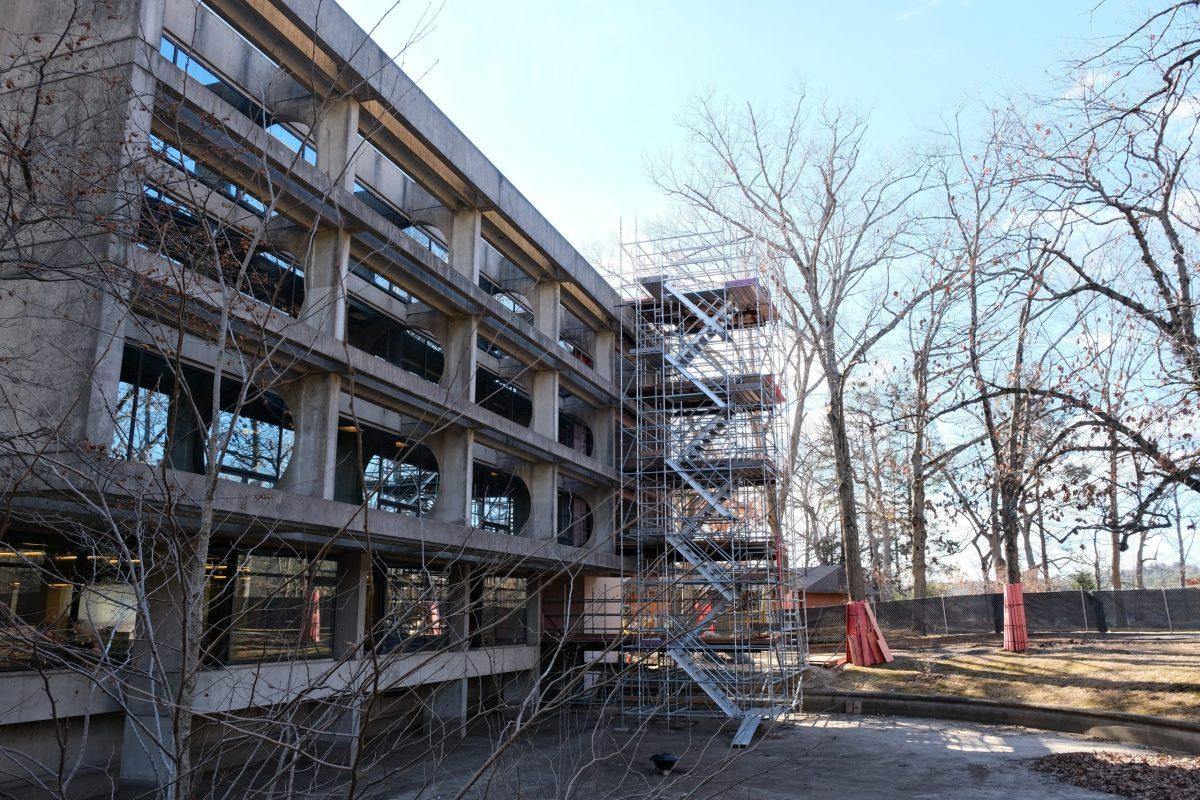As Wellesley students arrived back on campus after winter break, the fence around Clapp Library was a jarring sight. The library project began in May 2022 when the board of directors approved the renovation of the envelope — the HVAC, plumbing, electrical — in Clapp. These necessary updates quickly evolved into a full renovation of the library with the goal of creating a more accessible and modern library.
Clapp’s renovation project required tireless planning and logistical work, most of which occurred behind the scenes. Roughly 500,000 books had to be packed and moved to a secure location, not to mention the special care given to the archives and special collections. Months ahead of time, LTS staff worked with faculty and students to curate a collection of books to circulate in the temporary library space in the Modular Classroom and Labs, and the Special Collections curators worked with faculty to identify the 1000 most commonly used and relevant items for teaching.
Until Jan. 2025 when the project is scheduled to finish, many of the services that were once offered at Clapp are now being offered in the Modulars (or Mods). Some of these services include Interlibrary Loan (ILL), Media Services, the Knapp Center and general study spaces. Many amenities and resources formerly offered in Clapp have been dispersed to other places on Wellesley’s campus. Thesis carrels, for instance, have been moved to Claflin Dining Hall (which now also functions as a library study space), Cazenove Dining Hall, the Science Center and the Mods. The aforementioned curated works from Special Collections, available for viewing in the Catalog, have moved to the 5th floor of the Davis Museum, and the Book Arts Lab has relocated to Green Hall 153. These details and more are available on the Clapp renovation project website.
To students, these changes have elicited a sentiment of annoyance and inconvenience, but also some optimism. Talulah Juniper ’27, a student employed at the Knapp Center, said “I actually really like the space [in the Mods] … It feels collaborative, [and] more of a community space than it did before because it was all cubicles in the old Knapp center.”
Some of the enhancements of the library renovation are the upgrades to the Maker Space — which includes a modern open floor plan with many collaborative spaces — and the addition of a cafe, new Virtual Reality equipment, and a gaming nook all on the first floor. In the meantime, Juniper encourages other students to go to the Mods; they added, “As someone who wasn’t necessarily excited about the move, apprehensive even, I’d say it’s worth a visit!”
Aside from student workers, seniors who are thesising are the next most affected by the library’s renovations. Caroline Esposito ’24, one such student, is happy with some aspects of the renovations.
“I know that the library was not up to code — the bathrooms, cracks in the walls, the elevators — and I’m really glad that they’re updating it so we can spend time in safe and comfortable buildings, but it’s just frustrating that the lack of communication has come at the expense of students,” she said.
Esposito, like many other thesising seniors, is upset about her carrel moving out of the library.
“I used my thesis carrel in the library at least five days a week, and it was a very productive workspace,” she said. “After class, I would go to my carrel until 12am and get kicked out by the custodians, so it really was my main place to study, even during the day … [My carrel moving is] hard for me because I’m very productive in places that I’ve been actively productive in before, so moving to a new space is hard.”
Despite the frustration of transitioning spaces mid-year and at the lack of good communication from the college regarding the changes, Esposito noted that “the staff at the library is very kind and understanding about what’s going on.”
Ravi Ravishanker, the chief information officer and associate provost, Alexis Veigas, office and building manager for LTS, and Jenifer Bartle, director of Library Collections, offered additional information on the renovations.
“[We] are excited about the new enhancements to teaching and learning that are planned in many of the renovated spaces. There will be a new dedicated classroom in the Archives, expanded classrooms in Special Collections, and expanded technology-rich classrooms near the Makerspace, as well as a new testing center on the third floor dedicated for accommodated exams.”
Of the many updates, the one that LTS staff are particularly looking forward to sharing with students are the changes to the Presidential Portrait Room, otherwise known as the Reading Room.
“The previous computer equipment in that room will be relocated, making it a more traditional reading room space, and the historic wooden tables will be refinished with new chairs for seating.”
Although the library closing might be an inconvenience to many students, many of the changes being made to the library will make the space more accessible. Some of these updates include a ramp being added to the front entrance of the library, a wheelchair lift leading to the special collections room, and larger spacing in between bookshelves allowing for more wheelchair access. The changes being made to Clapp will eliminate many architectural barriers that exist within the building. Students are encouraged to make the best of the spaces available throughout the renovation as the changes to Clapp will be well worth the wait.




